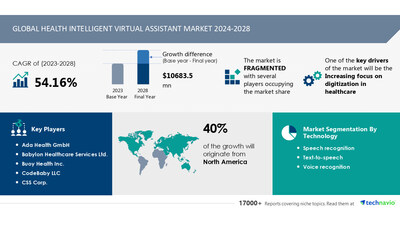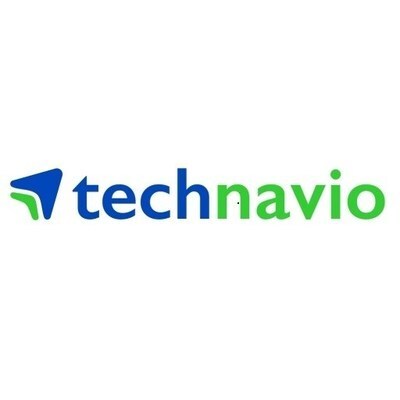Health Intelligent Virtual Assistant Market to Grow by USD 10.68 Billion from 2024-2028, Driven by Healthcare Digitization and AI’s Redefining Impact – Technavio

NEW YORK, Sept. 30, 2024 /PRNewswire/ — Report with market evolution powered by AI – The Global Health Intelligent Virtual Assistant Market size is estimated to grow by USD 10.68 billion from 2024-2028, according to Technavio. The market is estimated to grow at a CAGR of 54.16% during the forecast period. Increasing focus on digitization in healthcare is driving market growth, with a trend towards rising adoption of technology However, data security issues poses a challenge.Key market players include Ada Health GmbH, Babylon Healthcare Services Ltd., Buoy Health Inc., CodeBaby LLC, CSS Corp., eGain Corp., HealthTap Inc., Infermedica Sp. Z o.o., Kognito Solutions LLC, MedRespond, Microsoft Corp., Orbita Inc., PACT Care BV, Sense.ly Corp., True Image Interactive Inc., Verint Systems Inc., and Virgin Pulse Inc..
Key insights into market evolution with AI-powered analysis. Explore trends, segmentation, and growth drivers- View the snapshot of this report
|
Health Intelligent Virtual Assistant Market Scope |
|
|
Report Coverage |
Details |
|
Base year |
2023 |
|
Historic period |
2018 – 2022 |
|
Forecast period |
2024-2028 |
|
Growth momentum & CAGR |
Accelerate at a CAGR of 54.16% |
|
Market growth 2024-2028 |
USD 10683.5 million |
|
Market structure |
Fragmented |
|
YoY growth 2022-2023 (%) |
41.11 |
|
Regional analysis |
North America, Europe, APAC, South America, and Middle East and Africa |
|
Performing market contribution |
North America at 40% |
|
Key countries |
US, Germany, UK, China, and France |
|
Key companies profiled |
Ada Health GmbH, Babylon Healthcare Services Ltd., Buoy Health Inc., CodeBaby LLC, CSS Corp., eGain Corp., HealthTap Inc., Infermedica Sp. Z o.o., Kognito Solutions LLC, MedRespond, Microsoft Corp., Orbita Inc., PACT Care BV, Sense.ly Corp., True Image Interactive Inc., Verint Systems Inc., and Virgin Pulse Inc. |
Market Driver
The COVID-19 pandemic accelerated the adoption of data analytics in healthcare, particularly in operations and finance. Hospitals faced an unprecedented in patient load, leading organizations to invest in resources for effective patient care. Public health experts utilized data to identify severely affected areas, hospital administrators optimized resources, and telehealth providers targeted groups in need of their services. However, the emergence of new SARS-CoV-2 variants complicated patient care, necessitating the use of health intelligent virtual assistants. These digital platforms guided clinicians in decision-making and assisted patients remotely, becoming essential tools in managing the increasing disease profiles and online patient information. The adoption of health intelligent virtual assistants is anticipated to rise during the forecast period due to these factors.
The Health Intelligent Virtual Assistant market is witnessing significant growth due to the integration of deep neural networks and machine learning in chatbots and voice assistants. These technologies enable AI-assisted chatbots to provide medical counseling, therapy, and prescription services for US adults, especially those suffering from chronic diseases. Smart speakers like Amazon Alexa and Google Home are also being used in healthcare settings for automating tasks and providing voice assistance. Whole Foods, IT and Telecom companies, and healthcare providers are investing in these solutions to improve patient care and reduce loneliness and depression. Creative Virtual, Deep neural networks, and machine learning companies are leading this trend, with chatbots and voice assistants offering speech recognition, text-to-speech, and voice recognition capabilities. Healthcare workers and patients can benefit from these virtual assistants for medical advice, therapy sessions, and prescription refills.
Request Sample of our comprehensive report now to stay ahead in the AI-driven market evolution!
Market Challenges
- The healthcare industry handles a vast amount of personal and sensitive data, increasing the risks of data breaches and cybersecurity threats. Health intelligent virtual assistants, which store patients’ health records and clinical data elec
- tronically, pose significant risks of data piracy and unauthorized access. Common threats include data theft, unauthorized access, improper disposal, data loss, and hacking. The bring-your-own-device (BYOD) policy in hospitals exacerbates these risks. Cybersecurity is a major concern for the healthcare industry due to the interconnected nature of modern healthcare systems and the availability of a large volume of data. Cyberattacks have been increasing in the healthcare sector, with reports of over 1.9 million attacks in India alone in December 2022. Cloud solutions, used by some hospitals, also raise concerns due to the lack of data control and potential data dissemination, deletion, or corruption by unauthorized users. These factors hinder the adoption of healthcare software solutions, including health intelligent virtual assistants, and negatively impact the growth of the global market during the forecast period.
- The Health Intelligent Virtual Assistant market is growing rapidly as more US adults turn to technology for medical assistance. However, challenges persist. Loneliness and depression are common among seniors and those with chronic diseases. Providers seek automation and AI solutions to meet demand. Deep learning, speech recognition, and text-to-speech technologies power virtual assistants, enabling prescription refills, medical counseling, and therapy. IT and telecom companies like Creative Virtual leverage deep neural networks and machine learning to develop AI-assisted chatbots and smart speakers. Healthcare workers and patients benefit from these tools, reducing workload and improving access to care. Voice recognition and virtual assistants offer convenience, but accuracy remains a challenge. Companies like Whole Foods integrate these technologies into their services, expanding the market.
Discover how AI is revolutionizing market trends- Get your access now!
Segment Overview
This health intelligent virtual assistant market report extensively covers market segmentation by
- Technology
- 1.1 Speech recognition
- 1.2 Text-to-speech
- 1.3 Voice recognition
- 2.1 Chatbots
- 2.2 Smart speakers
- 3.1 North America
- 3.2 Europe
- 3.3 APAC
- 3.4 South America
- 3.5 Middle East and Africa
1.1 Speech recognition– Speech recognition technology is a crucial innovation in the digital world, converting spoken words into digital text with high accuracy and speed. It is extensively used in various applications, including automatic translations, hands-free computing, automated customer services, robotics, and medical transcription. In healthcare, speech recognition technology enhances daily operations for doctors, staff, and patients, ensuring compliance through advanced machine learning and natural language processing algorithms. The technology’s benefits, such as increased productivity and flexibility, enable doctors to focus more on patient care, improving overall healthcare delivery. As a result, the healthcare intelligent virtual assistant market is poised for significant growth due to the numerous advantages speech recognition offers.
Download a Sample of our comprehensive report today to discover how AI-driven innovations are reshaping competitive dynamics
Research Analysis
The Health Intelligent Virtual Assistant market is a rapidly growing segment in the healthcare industry, leveraging advanced technologies such as deep neural networks and machine learning to provide personalized healthcare solutions. These virtual assistants, which include chatbots and smart speakers, are revolutionizing patient care by offering 24/7 support for routine inquiries, appointment scheduling, and therapy sessions. They also address common health issues like loneliness and depression by providing companionship and emotional support. Automation through speech recognition, text-to-speech, and voice recognition technologies enable seamless interaction between patients and virtual assistants, enhancing the overall user experience. In contact centers, these virtual assistants streamline operations, reduce workload, and improve patient satisfaction.
Market Research Overview
The Health Intelligent Virtual Assistant market is experiencing significant growth due to the integration of deep neural networks and machine learning technologies. These advanced AI systems are being used to develop chatbots and voice assistants specifically designed for healthcare applications. Smart speakers and smartphones are becoming essential tools for US adults seeking medical advice, prescription refills, and chronic disease management. AI-assisted chatbots are providing medical counseling and therapy for various conditions, including loneliness and depression. Healthcare workers and patients benefit from automation, allowing them to focus on more complex tasks. Deep learning algorithms enable speech recognition and text-to-speech technology, enhancing the user experience. IT and telecom companies, along with Creative Virtual, are leading the way in this innovative market. These virtual assistants are revolutionizing healthcare, making it more accessible and convenient for all.
Table of Contents:
1 Executive Summary
2 Market Landscape
3 Market Sizing
4 Historic Market Size
5 Five Forces Analysis
6 Market Segmentation
- Technology
- Speech Recognition
- Text-to-speech
- Voice Recognition
- Product
- Chatbots
- Smart Speakers
- Geography
- North America
- Europe
- APAC
- South America
- Middle East And Africa
7 Customer Landscape
8 Geographic Landscape
9 Drivers, Challenges, and Trends
10 Company Landscape
11 Company Analysis
12 Appendix
About Technavio
Technavio is a leading global technology research and advisory company. Their research and analysis focuses on emerging market trends and provides actionable insights to help businesses identify market opportunities and develop effective strategies to optimize their market positions.
With over 500 specialized analysts, Technavio’s report library consists of more than 17,000 reports and counting, covering 800 technologies, spanning across 50 countries. Their client base consists of enterprises of all sizes, including more than 100 Fortune 500 companies. This growing client base relies on Technavio’s comprehensive coverage, extensive research, and actionable market insights to identify opportunities in existing and potential markets and assess their competitive positions within changing market scenarios.
Contacts
Technavio Research
Jesse Maida
Media & Marketing Executive
US: +1 844 364 1100
UK: +44 203 893 3200
Email: media@technavio.com
Website: www.technavio.com/
![]() View original content to download multimedia:https://www.prnewswire.com/news-releases/health-intelligent-virtual-assistant-market-to-grow-by-usd-10-68-billion-from-2024-2028–driven-by-healthcare-digitization-and-ais-redefining-impact—technavio-302261247.html
View original content to download multimedia:https://www.prnewswire.com/news-releases/health-intelligent-virtual-assistant-market-to-grow-by-usd-10-68-billion-from-2024-2028–driven-by-healthcare-digitization-and-ais-redefining-impact—technavio-302261247.html
SOURCE Technavio



